China's future in a post-Covid world
Stephen MulrenanWednesday 12 August 2020

As an emerging economic superpower, China has, over the past 20 years, become increasingly outward looking and ever more assertive. As the Covid-19 pandemic exacerbates existing concerns over human rights, security and foreign policy, Global Insight assesses what the future holds for China and its place in the world.
When Chinese President Xi Jinping and Indian Prime Minister Narendra Modi strode together along the banks of East Lake in Wuhan in April 2018, neither could have known that just two years later the city would become the epicentre of a global pandemic. While Covid-19 may have originated in Wuhan – though this is yet to be definitively confirmed – it has reaped considerably more damage in India than China.
India’s 906,752 confirmed cases, based on World Health Organization (WHO) data from 14 July, make it the third hardest hit country in the world after Brazil (1,864,681 cases) and the US (3,286,063 cases). Contrast that with the situation in China. While there is understandable scepticism over the statistics, as of 14 July, China had recorded 85,623 confirmed cases according to the WHO.
The pandemic has aggravated pent-up animosity between China and India. This came to a head on 15 June in a bloody skirmish between Chinese and Indian forces in the Himalayan region of Ladakh, which borders China. While it is unclear which side initiated the clash, what is clear is that 20 Indian soldiers died, marking the first casualties suffered between the Asian neighbours since 1975.
China did not reveal its number of casualties and media reports within the country were tightly controlled. While the Chinese Communist Party (CCP) claimed it did not wish to escalate the crisis, experienced China commentators believe that the CCP’s silence reflects a growing recognition of the difficult situation it finds itself in as a result of Covid-19.
China’s highly strategic portrayal of the incident in the Himalayas was allegedly due to the fact that the CCP had recently sown the seeds of friction on all sides. Former British Prime Minister Tony Blair voiced the concerns of many when he spoke recently of ‘a new aggressiveness and assertiveness about China,’ which ‘combined with the questions being asked as a result of the pandemic, lead people to a more hostile attitude towards the country.’
He says trading partners of China shouldn’t be faced with a stark choice between economic gain or upholding international values. The Tony Blair Institute for Global Change published a report in June entitled China’s role in the world, advocating a strategic approach to engaging with China. ‘You need a strategic response and not just a series of ad hoc reactions to Chinese activity or power,’ he says. ‘Our report is based on a fear that we won’t engage with China strategically. But it also reflects an optimism that, if we do, we’ll be able to push back where we need to push back, and work with them where we can.’
‘Wolf warrior’ diplomacy
Following four decades of reform initiated by Deng Xiaoping in 1978, China’s rising economic power in the early decades of the 21st century has been remarkable. This is manifested in enormous influence on global supply chains, increasingly through its military, and in terms of its global investment: it’s the largest investor across the continent of Africa by some distance.
But, in contrast to a diplomatic strategy of hiding strength employed by Deng, the CCP assessment today is that the Party is now strong enough to demonstrate its strength through so-called ‘wolf warrior’ diplomacy. Perhaps more significantly, China is being so aggressive with its diplomacy because it aligns with the policies of President Xi. Since being elected President in 2012, he’s told the Chinese people he would bring back the ‘China Dream.’
‘Evidently the Chinese government, especially under Xi Jinping’s leadership, has taken a position of expansionism,’ says Akira Kawamura, former IBA President and of counsel at Anderson Mori & Tomotsune. ‘The recent disputes with Hong Kong, India, Japan and Taiwan, as well as those in the South China Sea, all come from his mission and dream to recover the old Tang dynasty territories and to deliver that big dream to his people.’
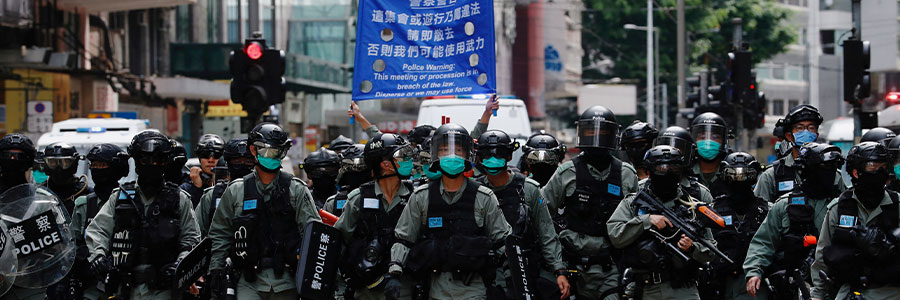
Riot police officers walk, as anti-national security law protesters march, during the anniversary of Hong Kong’s handover to China from Britain. Hong Kong, China. 1 July 2020. REUTERS/ Tyrone Siu
‘My own view is that this will never be successful,’ adds Kawamura. ‘Xi will fail at some stage because it’s an imperialistic dream that is unrealistic.’
A small group of islands in the East China Sea has provided another flashpoint in recent months. The uninhabited islands are known as the Senkaku Islands in Japan and the Diaoyu Islands in China, with both countries claiming them as their own. Although Japan has administered them since 1972, fears of a confrontation were heightened in June when the Japanese coastguard announced that Chinese government ships had been spotted in waters close to the islands for 65 consecutive days.
It should be no surprise to anyone that China would be interested in setting up some global institutions that might provide a counterweight to the Western institutions set up by the US and its allies in the aftermath of World War Two
Robert Lewis
Senior International Counsel, Zhong Lun Law Firm
Meanwhile, in the South China Sea, a Chinese ship rammed a Vietnamese fishing boat operating in the Paracel Islands in June in the second such incident in just over two months. Every year, more than $5tn in trade passes through the sea, which also houses an abundance of oil and natural gas resources.
China appears not to have taken an explicit position in terms of what it claims within the South China Sea. However, other countries – including the US – often refer to the so-called ‘nine-dash line’ that they say China has previously claimed as a marker of its own territory in the region. For example, US Secretary of State Mike Pompeo stated in mid-July that the US rejects China’s nine-dash line, alleging it lacks a coherent legal basis.
Ignoring a decision four years ago by the Permanent Court of Arbitration at The Hague, which rejected China’s claims of historic rights, China imposes an annual summer fishing ban in some disputed waters.
The Permanent Court of Arbitration also condemned China’s land reclamation projects in the South China Sea and its construction of artificial islands on seven features in the Spratly Islands archipelago. The case was initially filed in 2013 by the Philippines, which has competing claims in the South China Sea along with Brunei, Malaysia, Taiwan and Vietnam.
‘One country, two systems’
In Hong Kong, pro-democracy leaders have been systematically rounded up and detained and police officers exonerated for their role in the 2019 pro-democracy protests. Jail sentences and fines now await those who disrespect China’s national anthem.
Most controversial of all is the imposition in June by China’s Standing Committee of the National People’s Congress of a national security law to penalise acts of secession, subverting state power, and organising and carrying out terrorist activities. Dr Sophie Richardson, China Director at Human Rights Watch, says it is no coincidence the new law was imposed before September’s Legislative Council elections, where it’s likely to have been blocked by pro-democracy forces.
The Hon Justice Michael Kirby, Co-Chair of the IBA’s Human Rights Institute (IBAHRI), points out that although it’s possible that Beijing chose this time to enact its new security law in Hong Kong, the powerful disruptions on the streets over recent months would have been upsetting to them. ‘Because they do not generally permit freedom of association, the sight of all those young people running around exercising that freedom would have been a huge challenge to their notion of law and order,’ he says.
In Taiwan, the local populace gave a clear vote of no-confidence in China’s ‘one country, two systems’ model in January’s elections by re-electing President Tsai Ing-wen, who opposes unification with China. Beijing has in turn ramped up its military intimidation of Taiwan. Fighter patrols are regularly flown nearby, including across the median line of the Taiwan Strait, while military flotillas, led by China’s only aircraft carrier, are also now a common sight.
China’s treatment of the indigenous Uighur people in the autonomous northwestern region of Xinjiang has raised concerns, too.
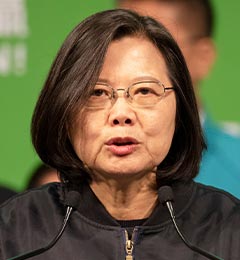
Taiwan’s President, Tsai Ing-wen, Taipei, January 2020. Shutterstock.com/O.O
Millions of people in Xinjiang are estimated by the US and the UN to have been detained in ‘re-education’ camps, where they’re made to renounce their Islamic faith and pledge loyalty to the CCP. The Chinese government has described these programmes as ‘vocational’ training, to better equip and assimilate Uighurs in Xinjiang by giving them skills to support themselves. It dismisses suggestions that these camps are involuntary indoctrination centres.
Distraction and pushback
It’s been suggested that the CCP’s aggressive stance towards Hong Kong and Taiwan, and its increasing international assertiveness in general, is simply a strategy to stoke nationalism within China and distract the Chinese people from a slowing economy. Unemployment is rising and China’s economy contracted for the first time in almost half a century, shrinking by 6.8 per cent in Q1 of 2020.
Kirby says distraction will be a major objective for those who have been less successful in combatting the pandemic. ‘However, I get the impression that China is less affected than many Western countries that trade with China. Its early urgent lockdown reduced the impact there, and as a consequence, globally,’ he adds.
Robert Lewis is Senior International Counsel at Zhong Lun Law Firm in Beijing. ‘It’s human nature and political instinct on the part of government leaders everywhere to accentuate good news and de-emphasise bad news,’ he says. ‘Although this is anecdotal, lawyer friends of mine in China are really busy. The big dip in Q1 had already been backfilled to a significant degree before the end of Q2.’
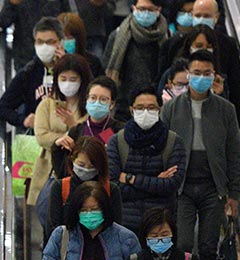
Commuters wear protective masks, Hong Kong, China, February 2020. Shutterstock. com/YT HUI
Lewis has been a resident in China for 30 years but was, at time of writing, stranded in Utah. ‘It will be interesting to see what the GDP figures are for Q2 for China as that will be a better gauge,’ he says. ‘The number one primary response of the Chinese government to the negative impact of the pandemic is to get the economy back on track and that’s similar to Western leaders. So, there’s only so much distraction that can divert attention from fundamental problems in the economy.’
While the pandemic-induced economic decline may be turning around nicely in China, that is certainly not the case everywhere else. This has led to some pushback by certain countries over both the origins of Covid-19 and some of China’s behaviour over the last few months.
One of the consequences of Hong Kong’s new security law, for example, has been the UK government’s offer of a path to citizenship for British National (Overseas) passport holders in Hong Kong. Other aspects of the UK’s relationship with China are also being reviewed by the UK government, such as banning Chinese firm Huawei from the UK’s 5G networks.
Australia, meanwhile, is seemingly being punished for calling for an independent investigation into the origins of Covid-19. China subsequently advised its citizens not to travel to the country, placed tariffs of more than 80 per cent on Australian barley and banned beef imports from the country. Prior to this, China was the biggest foreign buyer of both Australian barley and beef.
Given that Australia is so heavily dependent on trade with China, it took a certain courage – some may say foolhardiness – to launch the campaign for an independent probe, says Kirby. ‘Because the CCP is not accountable at home, in the same way democratic and older established polities are, it is not accustomed to being obliged to respond and adapt to questioning that makes it uncomfortable.’
The CCP’s challenges and ambitions
The CCP has faced internal pressure over its handling of the early stages of the pandemic as well as the continuing trade war with the US. And there is a broader internal debate over whether China should engage with the West or try and compete, building an alternative power centre almost in opposition to the West.
Under President Xi, the CCP has, in recent years, established a number of new global institutions – such as the New Development Bank in 2014 and the Asian Infrastructure Investment Bank (AIIB) in 2016 – that are favourable to China. ‘It should be no surprise to anyone that China would be interested in setting up some global institutions that might provide a counterweight to the Western institutions set up by the US and its allies in the aftermath of the Second World War,’ says Lewis. ‘These types of organisations are a natural function and extension of the role and aspirations of major superpowers.’
Lewis says that many of the challenges facing China today result from its intention to transition from an export economy to an import economy. ‘That’s something I really believe people in the West are lagging way behind on. I see it not just in political commentary but in news commentary all the time. China is still seen only as a low-cost manufacturing base, but those days have been passing with much of the low-cost manufacturing now in Southeast Asia.’
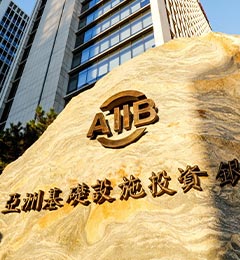
Asian Infrastructure Investment Bank’s headquarters, Beijing, China. September 2019. Shutterstock.com/humphery
Talk of China’s global ambitions often focuses on its Belt and Road Initiative (BRI), which the CCP has been aggressively promoting since it was first proposed by President Xi in 2013. More than 136 countries and 30 international organisations have signed BRI cooperation agreements with China, while the World Bank Group has designated 70 countries (other than China) as ‘corridor countries’ – countries geographically situated along one of the six proposed BRI transport corridors.
The international community simply cannot afford to confront transnational and global challenges without China, nor can China afford to shut itself to the world completely
Federica D’Alessandra
Co-Chair of the IBA Human Rights Law Committee
China has committed $614bn (approximately CNY 4.356tn) in BRI-related investments and construction contracts, while China’s total trade volume with BRI countries has increased from CNY 5tn in 2014 to CNY 8.4tn in 2018. However, while the BRI has the potential to significantly improve infrastructure and economic cooperation across the globe, Lewis says there are lingering questions and doubts about the feasibility of such an enormous campaign. ‘I regularly give lectures in China where I say the BRI is fraught with risk and danger for China and Chinese companies because it’s possible to make a lot of bad investment choices just because it falls under the BRI. The other thing is that there’s a lot more resistance around the world to Chinese investment and it’s not all in developed, industrial economies. We see an increasing resistance in developing countries as well.’
An example of this can be found in Sierra Leone, where President Julius Maada Bio, upon taking office, cancelled a loan deal signed by his predecessor for China to build a new $400m international airport.
What some commentators term China’s ‘debt-trap diplomacy’ is increasingly under scrutiny as are the country’s underlying geopolitical ambitions, says Lewis. ‘Although Chinese ambitions are there, they will come in contact with reality. These things are not self-executing. There is a response and it’s not always positive, and China will have to deal with that reality,’ he says.
‘I tell Chinese audiences that this is an extension of the fact that people are naturally suspicious of big power intentions,’ adds Lewis. ‘And I tell them that if the model proves to be disadvantageous to the host country and to the counterparty, that word gets around and people adjust their responses. We have this idea that China is this monolith and they’re just going to steamroll into Central Asia and into Eastern Europe. But that’s not going to be the case. There are natural responses to those type of activities and there’s an adjustment. The Chinese overall are extremely practical.’
Given the CCP’s focus on self-preservation, the fear in the West is that the more sensible voices within the Party will inevitably be overshadowed by the hardliners. Kirby says there is an inherent internal conflict in China between economic liberalism and political autocracy. ‘This will need to be resolved,’ he says. ‘The advent of President Xi has not been good for that resolution as he is much more inclined to autocracy than his recent predecessors. The long-term likelihood for resolution of the conflict is in favour of reconciliation of political freedoms with economic freedoms. However, the history of China does not naturally promote civil and political rights.’
The global availability of information – even in China where the internet is censored – means that individuals and society have access to much more information than they once did. ‘Information empowers questioning of autocracy,’ says Kirby. ‘As a highly rational people, the population of China will, over time, be more questioning and demanding of their leaders. Rationality suggests that we can be confident of the eventual outcome of the present paradoxical ambivalence between economic liberalism and civil and political control.’
Because the Chinese Communist Party is not accountable at home it is not accustomed to being obliged to respond and adapt to questioning that makes it uncomfortable
The Hon Justice Michael Kirby
Co-Chair of the IBA’s Human Rights Institute
Kawamura says the CCP will change when China’s foreign policy fails, citing as an historical example the Sino–Vietnam war of 1979. ‘That was a mistake of Chinese diplomacy and afterwards the Chinese government had a very big shift in power. I think similar things may take place in China after this pandemic and the hard, diplomatic strategies being pursued. Xi Jinping is not very safe.’
International approach
The strategic approach to engaging with China, as proposed by the Tony Blair Institute for Global Change, encompasses the ‘three Cs’: Cooperate, over transnational challenges; Compete, in areas such as tech and innovation; and Confront, where China acts contrary to the interests and values of the international community.
This approach isn’t new and is fairly widespread among Western foreign policy experts including Harvard Professor Joseph Nye, who calls it ‘co-operative rivalry.’ Federica D’Alessandra, Co-Chair of the IBA Human Rights Law Committee and Executive Director of the Oxford Programme on International Peace and Security agrees: ‘I also take this view, and think all three pillars are equally crucial to balancing Chinese power. The international community simply cannot afford to confront transnational and global challenges without China, nor can China afford to shut itself to the world completely.’
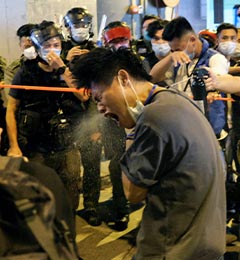
Police disperse pro-democracy protesters with pepper spray as they gather to mark the one year anniversary of an attack at Yuen Long, in Hong Kong, China. 19 July 2020. REUTERS/Tyrone Siu
Lewis says the challenge in the West is that, right now, the drumbeat of anti-China sentiment is so strong, and it’s not balanced by any other messages. ‘So, it’s becoming politically difficult for Western leaders to take certain positions that are not seen as sufficiently confronting China,’ he believes.
‘The China economic juggernaut is not going to be slowed simply by the responses of the Western industrialised nations,’ says Lewis. ‘Seeing things through a political lens is important but when something becomes a sole lens through which we see everything, then we are going to miss things.’
Kawamura recalls that when China entered the World Trade Organization in 2001, there was an assumption among Western leaders that, as the country evolved economically, it would evolve politically and in a more democratic and open direction. ‘That’s what I thought and that’s what I still think,’ he says. ‘It has not taken place now, but I think it will in the future. How long into the future I don’t know, but China will change again in the next ten years.’
While the Covid-19 pandemic has accelerated trends that had been developing for a number of years, leading in many cases to deteriorating relations between China and its trading partners, Lewis says the nature of societal change in the country has been extraordinary and should not be forgotten.
‘I cannot emphasise enough how it is such a different world in China today to what I first encountered 30 years ago,’ he explains. ‘And when I see the pace of change in the last five years, which has been more accelerated than the prior 25 years (and that was already extraordinary), we can’t really predict what we’re going to see in the next 25 years.’
Stephen Mulrenan is a partner at Lextel Partners Ltd and can be contacted at smulrenan@lextelpartners.com
